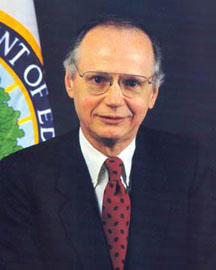Richard W. Riley
| Richard Riley | |
|---|---|
 |
|
| 6th United States Secretary of Education | |
|
In office January 21, 1993 – January 20, 2001 |
|
| President | Bill Clinton |
| Preceded by | Lamar Alexander |
| Succeeded by | Rod Paige |
| 111th Governor of South Carolina | |
|
In office January 10, 1979 – January 14, 1987 |
|
| Lieutenant |
Nancy Stevenson Michael Daniel |
| Preceded by | James Edwards |
| Succeeded by | Carroll Campbell |
| Member of the South Carolina Senate from the 2nd district |
|
|
In office January 9, 1973 – January 11, 1977 |
|
| Preceded by | Harris Smith |
| Succeeded by | Carroll Campbell |
| Member of the South Carolina Senate from the 3rd district |
|
|
In office January 10, 1967 – January 9, 1973 |
|
| Preceded by | Constituency established |
| Succeeded by | John W. Drummond |
| Personal details | |
| Born |
Richard Wilson Riley January 2, 1933 Greenville, South Carolina, U.S. |
| Political party | Democratic |
| Spouse(s) | Ann Yarborough |
| Education |
Furman University (BA) University of South Carolina, Columbia (LLB) |
| Military service | |
| Allegiance |
|
| Service/branch |
|
| Years of service | 1954–1955 |
Richard Wilson Riley (born January 2, 1933) is an American politician, the United States Secretary of Education under President Bill Clinton and the 111th Governor of South Carolina. He is a member of the Democratic Party. Riley is the only Democrat to serve two consecutive terms as Governor in the time since the state constitution was amended to allow Governors to serve consecutive terms.
Born on January 2, 1933 in Greenville, South Carolina, to Edward P. "Ted" Riley and the former Martha (née Dixon) Riley. He graduated cum laude from Furman University in 1954 and received his law degree from the University of South Carolina.
Riley served in the South Carolina House of Representatives from 1963 to 1966. He served in the South Carolina Senate from 1967 to 1977.
Riley was elected governor of South Carolina in 1978. During his first term, the state constitution was amended to allow governors to serve two terms. Riley was re-elected in 1982, 69-31 percent, over the Republican former journalist W. D. Workman, Jr., of Greenville, and served until 1987.
As Governor, Riley presided over the resumption of executions, despite his personal opposition to the death penalty.
...
Wikipedia
